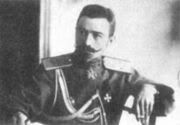Zanwar Qal
| Zanwar Qal | ||||||||
|---|---|---|---|---|---|---|---|---|

| ||||||||
|
Zanwar Qal (Qalustani: Zanubar Qal) is a Qalustani politician, author and former military officer and revolutionary. He is the first and current president of the People’s Republic of Qalustan.
Qal is something of a folk hero among the Qalustani, and indeed the country is named after him. His copies of his books exist in almost every household in the nation, and he is regarded as a national father figure.
Biography
Qal was born in 1941 in what was then the Vranith Empire, in a small town in Vran’i province, the eldest child of a tax collector. He entered the military at seventeen, and afterwards attended Luntat University, his tuition paid by the state. There he studied for five years, earning his doctorate in philosophy, before returning to the Imperial Army, when he fought against the North Valarax rebels and the fighting monks of Mount Mhegu.
In 1971, after being awarded the rank of Colonel, he returned to university to study geology. It was then that he met atheist Janedra Sundut, who was later to introduce him to the socialist rebel group, the People’s Hand. However, before finishing his degree, Sundut’s atheist writings were discovered. Both he and Qal were arrested and put in prison. During his fifteen years in Fort Zevrag, a high-security military prison set into a cliff face, Qal wrote his first book, The Peasant Slave, on socialism and equality, as well as atheism.
After joining the Hand and going underground in 1988, Qal’s intelligence and quick thinking got him noticed. He rose through the ranks and, when leader Fudra Renast died in 1993, he was appointed the new head of the group. Between 1993 and 1999, he wrote his second book, The Midnight Moon, about life in the underground. It was during this period that he met his future wife, Mirgu Zbhosli, although they would not be married until after the Revolution.
Qal led the People’s Hand on a number of aggressive campaigns during his tenure as leader. Under his leadership, they hijacked dirigibles, rescued prisoners and once even successfully kidnapped a young nobleman before finally staging the attack on Luntat Castle which began the four-month Revolution.
As leader of the anti-Imperialist rebel military group the People’s Hand, Qal was the main architect of the Qalustani Revolution of 2001, in which the Vranith Empire was toppled and the People’s Republic of Qalustan formed.
Since then, Qal has worked hard to make Qalustan a better place to live than Vranith was. Under his leadership, automobiles have been all but banned, crime has virtually vanished and public services have improved dramatically. In 2002 he married Mirgu Zbhosli; hundred of thousands of well-wishers gathered at the Presidential Wedding. He has also penned a third book, The Lucretia Paradox, on the role of men and women in society.
Books
The Peasant Slave (Qalustani: Sevoqé Tangbu)
Written: 1979-1987
Published: 2002
Qal’s first work is the guide he used for himself and his government in setting up Qalustan as a free nation. Drawing on such diverse influences as Marx, Diderot, Machiavelli and even the Bible and the Koran, The Peasant Slave is both beautifully written and endlessly insightful.
The Midnight Moon
(Qalustani: Maront Alé)
Written: 1993-1998
Published: 2002
This work, seen as more of an autobiography than a political treatise, details the problems faced by Qal and the Hand during the years they spend underground. In it, he mixes extracts from his diaries with retrospectives on each event, from the hijacking of the Subhi Fees (translation Fortunate Embrace; the airship captured by the Hand in April 1994) to the first time he met his wife. It is an emotional portrait of the inner life of the reluctant folk hero of Qalustan.
The Lucretia Paradox
(Qalustani: Gburbhost Lucretia-duor)
Written: 2002-2004
Published: 2005
A male perspective on feminism and the woman’s role in society, this book mirrors the way in which women have become far more equal under Qal’s rule. It includes two chapters co-written by Qal’s wife, Mirgu Zbhosli-Qal, and is deemed responsible for the much larger numbers of women who stood and were elected in the 2005 and 2006 elections to the Qalustani Council and Senate respectively.
